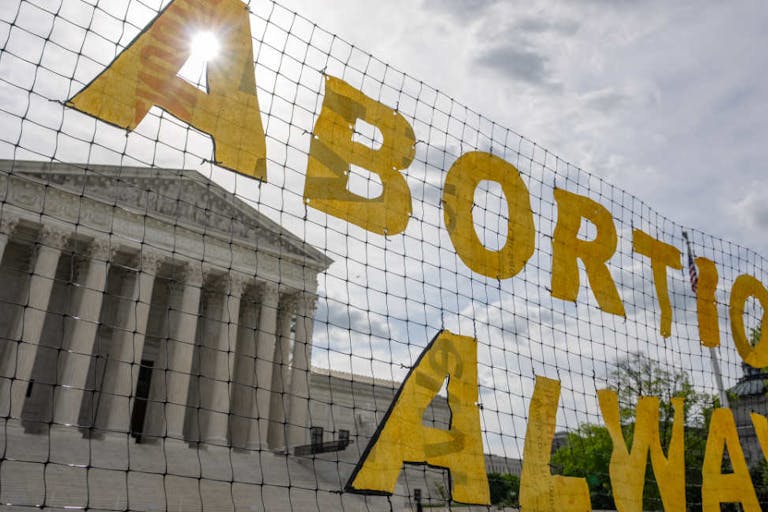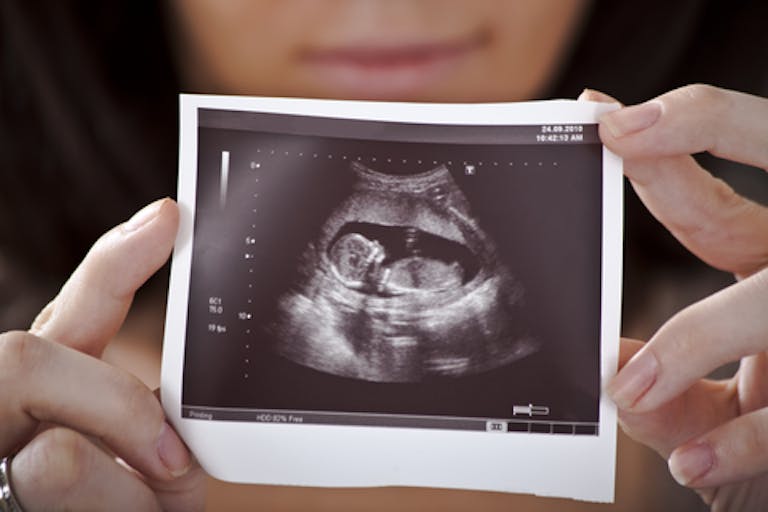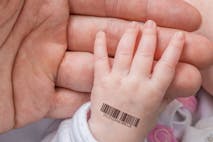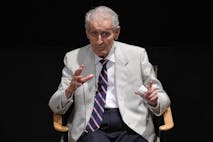
A growing number of Americans call themselves ‘pro-choice’ – but what’s really behind it?
Nancy Flanders
·
Miscarriage, abortion, and denying humanity of the unborn
There’s a clear double standard surrounding pregnancy in this country – well, for about half of us, anyway. For the Americans who support abortion, pregnancy is a gift which lets you bring life into the world, where a baby grows inside of you…provided that it’s a wanted pregnancy. On the other side of the coin, pregnancy is a condition forced upon women in which a parasite acts like a leech, killing a woman’s chance for a hopeful and happy future, and the creature living inside the woman is just a clump of cells, a product of conception, anything but a baby.
Two radically different views of the exact same event, and the only difference is whether or not the pregnancy was wanted. It must be easier to be pro-abortion if you are able to ignore the humanity of the unborn.
Salon blogger JJ Keith wrote an essay about how suffering three miscarriages caused her to doubt her pro-choice beliefs. Understandably, her grief over her miscarriages made her wonder whether abortion is truly right.
I’ve been pro-choice since before I even understood what was at stake. And yet, when I chose to have a baby while still in my allegedly fertile late-20s, all I could produce were the kind of clots sucked out during a D&C. I chose baby. Where was my baby?
I still don’t know. I mean, I know where my babies are. The end results of pregnancies No. 4 and No. 5 are now bounding preschoolers with scraped knees and very firm opinions about tomatoes (one for and one against). I am lucky among people who choose to reproduce in that I eventually got to. I would like to say that my son and daughter are the children always intended for me by some force that I don’t understand and probably don’t believe in; that those other pregnancies were just my real kids making RSVPs they couldn’t keep, but that’s just not how I feel. It doesn’t make any sense to me, at least not intellectually, but I feel like I have five children — two born and three who were not born, which is a point-of-view that is hard to reconcile with being pro-choice.
It’s not unusual for mothers who have miscarried babies to say they feel like they are still the mother of those children. But of course that point-of-view is at odds with supporting abortion. If you accept that your unborn child is, in reality, a child, and that losing that child is worthy of grief and mourning, then it throws abortion into an entirely different – and more horrible – light. When you can brush an unborn baby off as nothing more than a clump of tissue, then it’s not a big deal to get rid of it. When you realize it’s a child, a person, suddenly abortion becomes murder. And that would be uncomfortable at the absolute least for a pro-abort to wrestle with.
Article continues below
Dear Reader,
In 2026, Live Action is heading straight where the battle is fiercest: college campuses.
We have a bold initiative to establish 100 Live Action campus chapters within the next year, and your partnership will make it a success!
Your support today will help train and equip young leaders, bring Live Action’s educational content into academic environments, host on-campus events and debates, and empower students to challenge the pro-abortion status quo with truth and compassion.
Invest in pro-life grassroots outreach and cultural formation with your DOUBLED year-end gift!
Now five years later, I have been thoroughly colonized. I have been suckled, stretched and irrevocably altered, an ongoing process that is in equal parts rejuvenating and corrosive. I cannot imagine undergoing the transformation from woman to mom/woman without consent, but for me, becoming a mother has brought me an indescribable quantity and quality of joy. I’m eternally glad that I didn’t give up on my wish to raise children. However, I finally truly understand why motherhood has to be a choice. It is too much to ask of an unwilling person.
Though I am not religious, I have many religious friends, some of whom oppose reproductive choice. With them I’ve talked about what or who was lost when I miscarried. My friends and I do not agree about many things, but we are all certain that what was lost was substantive. However, even the most ardently anti-choice people I know do not mourn those three miscarriages as if I had lost three children. Having a stillborn baby is different from a miscarriage. Losing a child is different still. Hidden in our collective intuitive response to miscarriage is the reason why choosing to terminate a pregnancy is different from killing a baby: People can’t be OxyCleaned out of your underwear.
Keith makes two disturbing arguments here. First is her argument that motherhood is too much to ask of an unwilling person. In some exceedingly rare circumstances, mainly rape, it is true that a pregnancy can occur when someone did not want to accept the possibility of becoming a mother. It is another uncomfortable truth amongst pro-aborts, who like to claim that birth control makes sex 100% safe always, that any time a man and woman engage in sexual intercourse, they are willingly choosing to open the door to the possibility of parenthood. It’s a simple fact. This idea that pregnancy is just something that randomly happens to unwitting women is, quite frankly, ridiculous. If a woman truly does not feel she’s ready for a baby, then she can choose to abstain from sex. It really is that simple.
The second disturbing argument is how apparently, the justification for the death of a child depends on how developed he is – or isn’t. A miscarried baby is not as devastating as a stillbirth, which is not as devastating as the death of an older child. Does that mean that, to Keith, humans have more worth depending on how developed they are? There aren’t acceptable levels of grief given to women depending on where they are in their journey of parenthood; a mother of a miscarried baby might mourn more than the mother of a stillborn child because she never got to see her child’s face or cradle him in her arms. The mother of a stillborn might grieve more than the mother of an older child because she never got to experience the years with her child that the other mother did.
The thing is, this really isn’t about levels of grief. It’s about the idea that a person has more value depending on his age and development. It’s a common thought among pro-aborts, and isn’t particularly shocking, but it’s still disturbing. What is it that makes people think that they have the right to determine the value of a person, or to define when humanity begins?
Live Action News is pro-life news and commentary from a pro-life perspective.
Contact editor@liveaction.org for questions, corrections, or if you are seeking permission to reprint any Live Action News content.
Guest Articles: To submit a guest article to Live Action News, email editor@liveaction.org with an attached Word document of 800-1000 words. Please also attach any photos relevant to your submission if applicable. If your submission is accepted for publication, you will be notified within three weeks. Guest articles are not compensated (see our Open License Agreement). Thank you for your interest in Live Action News!

Nancy Flanders
·
Issues
Angeline Tan
·
Guest Column
Emily Berning
·
Opinion
Nancy Flanders
·
Opinion
Mark Wiltz
·
Opinion
Mark Wiltz
·
Politics
Cassy Cooke
·
Politics
Cassy Cooke
·
Pop Culture
Cassy Cooke
·
International
Cassy Cooke
·
Analysis
Cassy Cooke
·